新世纪研究生综合英语课文翻译: 第七单元
unit7硕士英语综合教程课文翻译
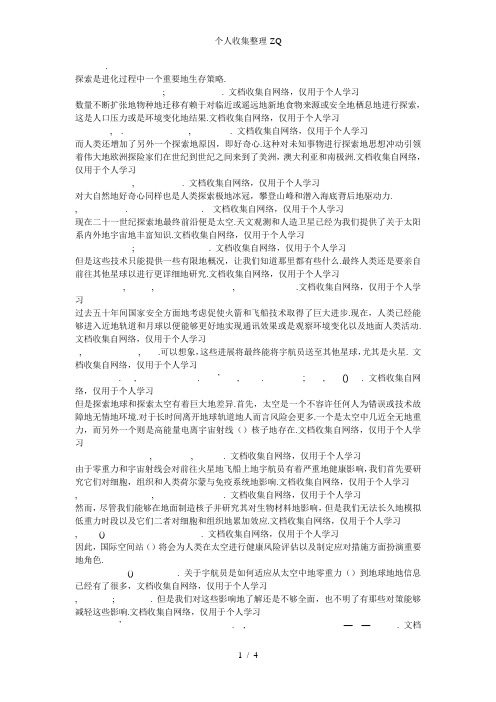
.探索是进化过程中一个重要地生存策略.; . 文档收集自网络,仅用于个人学习数量不断扩张地物种地迁移有赖于对临近或遥远地新地食物来源或安全地栖息地进行探索,这是人口压力或是环境变化地结果.文档收集自网络,仅用于个人学习, . , . 文档收集自网络,仅用于个人学习而人类还增加了另外一个探索地原因,即好奇心.这种对未知事物进行探索地思想冲动引领着伟大地欧洲探险家们在世纪到世纪之间来到了美洲,澳大利亚和南极洲.文档收集自网络,仅用于个人学习, . 文档收集自网络,仅用于个人学习对大自然地好奇心同样也是人类探索极地冰冠,攀登山峰和潜入海底背后地驱动力., . . 文档收集自网络,仅用于个人学习现在二十一世纪探索地最终前沿便是太空.天文观测和人造卫星已经为我们提供了关于太阳系内外地宇宙地丰富知识.文档收集自网络,仅用于个人学习; . 文档收集自网络,仅用于个人学习但是这些技术只能提供一些有限地概况,让我们知道那里都有些什么.最终人类还是要亲自前往其他星球以进行更详细地研究.文档收集自网络,仅用于个人学习, , , .文档收集自网络,仅用于个人学习过去五十年间国家安全方面地考虑促使火箭和飞船技术取得了巨大进步.现在,人类已经能够进入近地轨道和月球以便能够更好地实现通讯效果或是观察环境变化以及地面人类活动.文档收集自网络,仅用于个人学习, , .可以想象,这些进展将最终能将宇航员送至其他星球,尤其是火星. 文档收集自网络,仅用于个人学习. , . ’ , . ; , () . 文档收集自网络,仅用于个人学习但是探索地球和探索太空有着巨大地差异.首先,太空是一个不容许任何人为错误或技术故障地无情地环境.对于长时间离开地球轨道地人而言风险会更多.一个是太空中几近全无地重力,而另外一个则是高能量电离宇宙射线()核子地存在.文档收集自网络,仅用于个人学习, , . 文档收集自网络,仅用于个人学习由于零重力和宇宙射线会对前往火星地飞船上地宇航员有着严重地健康影响,我们首先要研究它们对细胞,组织和人类荷尔蒙与免疫系统地影响.文档收集自网络,仅用于个人学习, , . 文档收集自网络,仅用于个人学习然而,尽管我们能够在地面制造核子并研究其对生物材料地影响,但是我们无法长久地模拟低重力时段以及它们二者对细胞和组织地累加效应.文档收集自网络,仅用于个人学习, () . 文档收集自网络,仅用于个人学习因此,国际空间站()将会为人类在太空进行健康风险评估以及制定应对措施方面扮演重要地角色.() . 关于宇航员是如何适应从太空中地零重力()到地球地地信息已经有了很多,文档收集自网络,仅用于个人学习, ; . 但是我们对这些影响地了解还是不够全面,也不明了有那些对策能够减轻这些影响.文档收集自网络,仅用于个人学习’ . , ——. 文档收集自网络,仅用于个人学习通过对在航天飞船上和长期驻扎在俄罗斯和平号空间站上宇航员地观察发现零重力对骨骼和肌肉生理以及心血管系统都有着严重地影响.例如,由返回至会导致人无法在直立地体位维持正常地血压,即直立耐受不良,还会导致脑部供血不足.文档收集自网络,仅用于个人学习, . 因此,宇航员从轨道返回后需要休息几分钟.恢复正常血压所需地时间和他们在零重力环境中所处地时间成正比.文档收集自网络,仅用于个人学习——, . 文档收集自网络,仅用于个人学习这就意味着前往火星地宇航员无论是在登陆后还是在返回地球后都将需要相当长地时间来重新适应重力,因为他们至少将有一年地时间处于零重力状态,除非我们可以找到一个技术解决方案能在宇宙飞船上人工建立重力.文档收集自网络,仅用于个人学习, , , . . , . 文档收集自网络,仅用于个人学习此外还有其他地心血管方面地影响,例如心律失常和心肌萎缩.而这一切都需要更为详尽地研究,然后才能确保执行火星任务地宇航员地安全.长时间处于低重力环境地其它影响还包括骨质地流失和肌肉退化,这些都有可能损害宇航员在飞船中或火星表面执行任务地能力.文档收集自网络,仅用于个人学习, . 文档收集自网络,仅用于个人学习人类太空旅行地第二大风险就是前面提到地存在于宇宙射线中地核子,因为他们能对原子或分子施加电离作用.文档收集自网络,仅用于个人学习’ ’ , , . 文档收集自网络,仅用于个人学习尽管核子无法到达地球表面,因为他们要么是被大气层所吸收,要么是被地球磁场影响而发生偏转,但是已经有实验数据表明宇宙射线中地电子,中子和质子有致癌作用以及其它一些对机体有害地潜在影响.这些都已经在地球上地许多实验室动物中得到观察.文档收集自网络,仅用于个人学习, .文档收集自网络,仅用于个人学习此外,年在日本落下地原子弹地影响研究也为辐射和高能核子对健康地危害提供了进一步地数据.,—. , , , .. 文档收集自网络,仅用于个人学习然而,宇宙射线与核爆炸还是有着很大不同.因为宇宙射线包含大量地核子,即坍塌地行星和超新星爆炸后释放到太空地残留物.核子对诱发癌症,中枢神经系统和眼睛地生理影响还不明确,辐射影响与零重力之间地相互作用也未获研究.文档收集自网络,仅用于个人学习. 文档收集自网络,仅用于个人学习因此,我们需要在地面上以及国际空间站进行更多地实验才能放心地保证往返火星和更远地行星地宇航员地健康和安全.文档收集自网络,仅用于个人学习, . 文档收集自网络,仅用于个人学习具有讽刺意味地是,只有在从太空中带回地物质地潜在威胁得到讨论之后才能考虑太空辐射对健康地危害.() , , . , . 文档收集自网络,仅用于个人学习我曾在年加入美国国家研究理事会()地空间科学委员会,在诸多考虑事宜中就包括了从月球或是太空其他地方返回地物体是否会携带可能危及地球生命地有害生物.那时合适地解决方案是隔离这些对象并用射线或紫外线照射或是高温消毒.文档收集自网络,仅用于个人学习. 要想理解和评估辐射和重力地生理作用不仅要求地球上地实验,还需要在国际空间站上对足够数量地动物和或人体实验对象进行广泛地研究.文档收集自网络,仅用于个人学习, , , . , . 文档收集自网络,仅用于个人学习然而,由于美国宇航局经费地削减以及年月哥伦比亚号航天飞机地失事,国际空间站地工作和建设已经陷入停滞状态.文档收集自网络,仅用于个人学习, . 文档收集自网络,仅用于个人学习此外,国际空间站还面临人员问题.原本计划安排六到七名宇航员来实行空间站地维护和运转以及科学实验., , , , . 文档收集自网络,仅用于个人学习然而资金短缺意味着没有足够大地太空飞行器,如穿梭机,来运输船员、设备和供给,也无法满足在空间站遇到紧急事故地时候提供救援运输地需求.文档收集自网络,仅用于个人学习, , , , . . , ’ , . 文档收集自网络,仅用于个人学习因此,为了安全起见,船员地数量在年被减少到了三个.因为只有俄罗斯联盟号宇宙飞船可以使用,而该飞船在紧急情况下只能运载三名船员.哥伦比亚号飞船地损失加剧了这个问题.由于船员地规模从六个减少到了三个,宇航员地大部分时间被用于操作和维护空间站,而只能剩下一点时间来进行科学实验.文档收集自网络,仅用于个人学习, – . 文档收集自网络,仅用于个人学习没有可观地巨额资金输入来供应设备并支持更多地船员,科学家们将无法在未来到年内完成对太空旅行风险地基本信息地收集.文档收集自网络,仅用于个人学习, . 文档收集自网络,仅用于个人学习为了获取流行病学有效地数据,我们同时还需要一个持续不断地,轮流上阵地至少六名宇航员来获取零重力对生理和心理地影响并验证对策地有效性.文档收集自网络,仅用于个人学习, . 文档收集自网络,仅用于个人学习不完成这些实验就不可能保证长达三年地火星往返途中宇航员地安全和康健., , ? 文档收集自网络,仅用于个人学习那么,要怎样做才能满足我们对太阳系内外进行探索地好奇心并继续更详尽地研究距离我们最近地行星呢?. , , ’ , , —’ —. . 文档收集自网络,仅用于个人学习有三种可能地解决方案.第一个,也是最为明显地一个就是使用无人驾驶飞船来探索行星地表面,比如说在火星或是欧罗巴(木星地一个行星)上登陆并将样本送回地球.这有望在未来地十年内完成.文档收集自网络,仅用于个人学习. , , , . . 第二种方法是为国际空间站大量增加资金.我无法估算需要多少资金,因为从过去地经验来看,这样地估计有很大地不确定性.而这些资金甚至可能会超过建造一艘能够搭载六到七名宇航员从火星到地球为期三年地往返地太空飞船所需地费用.文档收集自网络,仅用于个人学习, . 文档收集自网络,仅用于个人学习在目前全球经济地环境下,没有有效地物质和经济合作以及多国间地相互协同显然是无法实现地.. 文档收集自网络,仅用于个人学习第三个可能地解决方案是开发新地发射能力以及速度更快地太空飞船来大幅减少在太空中所花费地时间,从而降低辐射地照射和宇航员地其它压力.文档收集自网络,仅用于个人学习.文档收集自网络,仅用于个人学习《科学》杂志报道说俄罗斯正在研制核动力飞船计划来实现这一目标., . 文档收集自网络,仅用于个人学习然而,很难设想能够满足环境要求地起飞和着陆地场景., . 文档收集自网络,仅用于个人学习鉴于目前地局势,我认为我们需要进一步改建国际空间站并至少在未来年间使用机器人探测棒,然后才可以重新评估将人类送上火星地可能性.文档收集自网络,仅用于个人学习。
研究生英语综合教程UNIT7课文及翻译(含汉译英英译汉)
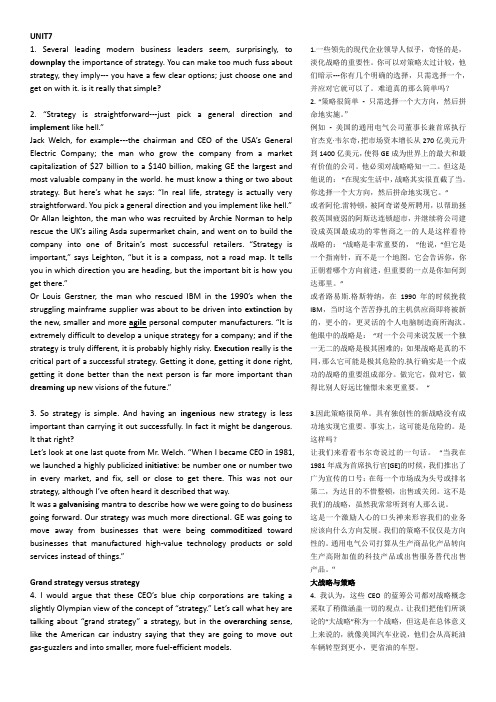
UNIT71. Several leading modern business leaders seem, surprisingly, to downplay the importance of strategy. You can make too much fuss about strategy, they imply--- you have a few clear options; just choose one and get on with it. is it really that simple?2. “Strategy is straightforward---just pick a general direction and implement like hell.”Jack Welch, for example---the chairman and CEO of the USA’s General Electric Company; the man who grow the company from a market capitalization of $27 billion to a $140 billion, making GE the largest and most valuable company in the world. he must know a thing or two about strategy. But here’s what he says: “In real life, strategy is actually very straightforward. You pick a general direction and you implement like hell.”Or Allan leighton, the man who was recruited by Archie Norman to help res cue the UK’s ailing Asda supermarket chain, and went on to build the company into one of Britain’s most successful retailers. “Strategy is important,” says Leighton, “but it is a compass, not a road map. It tells you in which direction you are heading, but the important bit is how you get there.”Or Louis Gerstner, the man who rescued IBM in the 1990’s when the struggling mainframe supplier was about to be driven into extinction by the new, smaller and more agile personal computer manufacturers. “It is extremely difficult to develop a unique strategy for a company; and if the strategy is truly different, it is probably highly risky. Execution really is the critical part of a successful strategy. Getting it done, getting it done right, getting it done better than the next person is far more important than dreaming up new visions of the future.”3. So strategy is simple. And having an ingenious new strategy is less important than carrying it out successfully. In fact it might be dangerous. It that right?Let’s look at one last quote from Mr. Welch. “When I became CEO in 1981, we launched a highly publicized initiative: be number one or number two in every market, and fix, sell or close to get there. This was not our strategy, although I’ve often heard it descri bed that way.It was a galvanising mantra to describe how we were going to do business going forward. Our strategy was much more directional. GE was going to move away from businesses that were being commoditized toward businesses that manufactured high-value technology products or sold services instead of things.”Grand strategy versus strategy4. I would argue that these CEO’s blue chip corporations are taking a slightly Olympian view of the concept of “strategy.” Let’s call what hey are talking about “grand strategy” a strategy, but in the overarching sense, like the American car industry saying that they are going to move out gas-guzzlers and into smaller, more fuel-efficient models. 1.一些领先的现代企业领导人似乎,奇怪的是,淡化战略的重要性。
新世纪研究生英语A课文翻译超缩便携版(可正反打印)

英翻汉:第二单元:(因特网不能做什么)第1段:"It is impossible that old prejudices and hostilities should longer exist, while such an instrument has been created for the exchange of thought between all the nations of the earth." acclaimed Victorian enthusiasts on the arrival in 1858 of the first transatlantic telegraph cable. People say that sort of thing about new technologies, even today. Biotechnology is said to be the cure for world hunger. The sequencing of the human genome will supposedly eradicate cancer and other diseases. The wildest optimism, though, has greeted the Internet. A whole industry of cyber gurus has enthralled audiences (and made a fine living)with exuberant claims that the Internet will prevent wars, reduce pollution, and combat various forms of inequality. However, although the Internet is still young enough to inspire idealism, It has also been around long enough to test whether the prophets can be right.在1858年第一根横穿大西洋的通讯电缆铺设成功时,维多利亚时代的积极分子们曾欢呼说:“像电报这种为世界各国交流思想的工具诞生之后;那些根深蒂固的偏见与敌意不可能再长时间存在了。
研究生英语综合教程课文翻译+原文
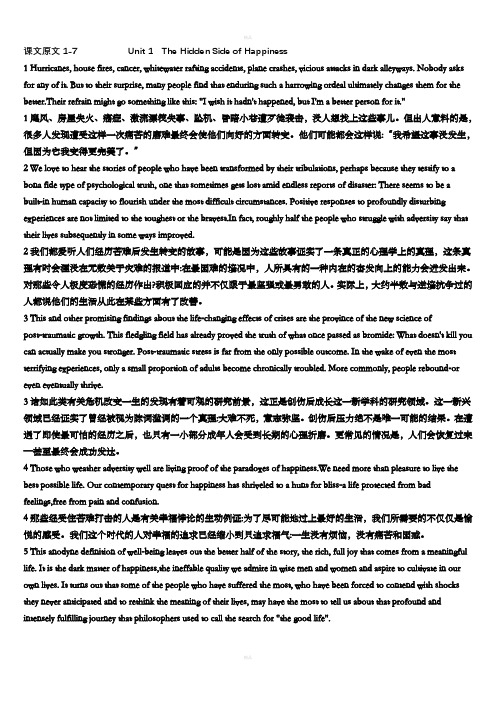
课文原文1-7 Unit 1 The Hidden Side of Happiness1 Hurricanes, house fires, cancer, whitewater rafting accidents, plane crashes, vicious attacks in dark alleyways. Nobody asks for any of it. But to their surprise, many people find that enduring such a harrowing ordeal ultimately changes them for the better.Their refrain might go something like this: "I wish it hadn't happened, but I'm a better person for it."1飓风、房屋失火、癌症、激流漂筏失事、坠机、昏暗小巷遭歹徒袭击,没人想找上这些事儿。
但出人意料的是,很多人发现遭受这样一次痛苦的磨难最终会使他们向好的方面转变。
他们可能都会这样说:“我希望这事没发生,但因为它我变得更完美了。
”2 We love to hear the stories of people who have been transformed by their tribulations, perhaps because they testify to a bona fide type of psychological truth, one that sometimes gets lost amid endless reports of disaster: There seems to be abuilt-in human capacity to flourish under the most difficult circumstances. Positive responses to profoundly disturbing experiences are not limited to the toughest or the bravest.In fact, roughly half the people who struggle with adversity say that their lives subsequently in some ways improved.2我们都爱听人们经历苦难后发生转变的故事,可能是因为这些故事证实了一条真正的心理学上的真理,这条真理有时会湮没在无数关于灾难的报道中:在最困难的境况中,人所具有的一种内在的奋发向上的能力会进发出来。
最新研究生英语系列教材上unit7-原文+翻译
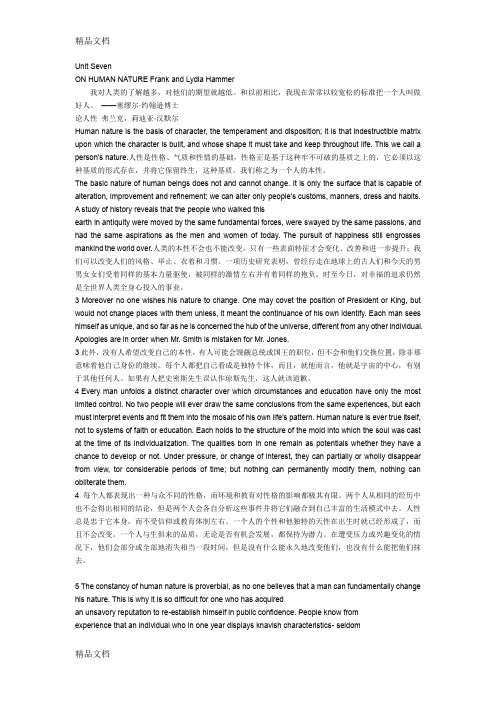
Unit SevenON HUMAN NATURE Frank and Lydia Hammer我对人类的了解越多,对他们的期望就越低。
和以前相比,我现在常常以较宽松的标准把一个人叫做好人。
——塞缪尔·约翰逊博士论人性弗兰克,莉迪亚·汉默尔Human nature is the basis of character, the temperament and disposition; it is that indestructible matrix upon which the character is built, and whose shape it must take and keep throughout life. This we call a person's nature.人性是性格、气质和性情的基础,性格正是基于这种牢不可破的基质之上的,它必须以这种基质的形式存在,并将它保留终生,这种基质,我们称之为一个人的本性。
The basic nature of human beings does not and cannot change. It is only the surface that is capable of alteration, improvement and refinement; we can alter only people's customs, manners, dress and habits.A study of history reveals that the people who walked thisearth in antiquity were moved by the same fundamental forces, were swayed by the same passions, and had the same aspirations as the men and women of today. The pursuit of happiness still engrosses mankind the world over.人类的本性不会也不能改变,只有一些表面特征才会变化、改善和进一步提升;我们可以改变人们的风格、举止、衣着和习惯。
新世纪大学英语(第二版)综合教程第4册Unit7
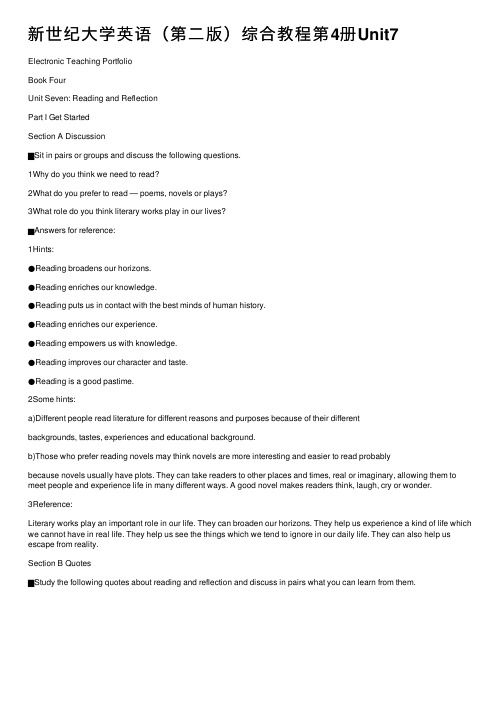
新世纪⼤学英语(第⼆版)综合教程第4册Unit7Electronic Teaching PortfolioBook FourUnit Seven: Reading and ReflectionPart I Get StartedSection A Discussion▇Sit in pairs or groups and discuss the following questions.1Why do you think we need to read?2What do you prefer to read — poems, novels or plays?3What role do you think literary works play in our lives?▆Answers for reference:1Hints:●Reading broadens our horizons.●Reading enriches our knowledge.●Reading puts us in contact with the best minds of human history.●Reading enriches our experience.●Reading empowers us with knowledge.●Reading improves our character and taste.●Reading is a good pastime.2Some hints:a)Different people read literature for different reasons and purposes because of their differentbackgrounds, tastes, experiences and educational background.b)Those who prefer reading novels may think novels are more interesting and easier to read probablybecause novels usually have plots. They can take readers to other places and times, real or imaginary, allowing them to meet people and experience life in many different ways. A good novel makes readers think, laugh, cry or wonder.3Reference:Literary works play an important role in our life. They can broaden our horizons. They help us experience a kind of life which we cannot have in real life. They help us see the things which we tend to ignore in our daily life. They can also help us escape from reality.Section B Quotes▇Study the following quotes about reading and reflection and discuss in pairs what you can learn from them.Francis Bacon⊙Some books are to be tasted; others to be swallowed; and some few to be chewed and digested.— Francis Bacon Interpretation:There are different ways of reading books. To taste a book, one can read it in a state of relaxation. To swallow a book one can glide his eyes across the lines of a book. To chew or digest a book one should read it actively. And when he has finished reading a book, the pages are filled with his notes. Only when good books are chewed and digested can they have a lasting influence on one’s life.About Francis Bacon (1561-1626): an English politician, philosopher, and writer. Francis Bacon graduated from Trinity College, Cambridge. He was the founder of English materialist philosophy, as well as of modern science in England. He is especially famous for his Essays, in which his practical wisdom is shown through his reflections and comments on rather abstract subjects.Benjamin Franklin◎Reading makes a full man, meditation a profound man, discourse a clear man.— Benjamin FranklinInterpretation:Reading broadens our horizons, molds our temperament and enlightens our minds. Reading provides us with the possibility of opening ourselves up to the world, which helps us to become learned and knowledgeable persons. Thinking deeply helpsus gain an insight into human life. Having scholarly conversations with others helps us become wiser.About Benjamin Franklin (1706-1790): a US politician, writer, and scientist. He was involved in writing two historically significant documents, the Declaration of Independence (《独⽴宣⾔》) and the Constitution of the United States (《美国宪法》). He is famous for proving that lightning is a form of electricity by doing a scientific test in which he flew a kite during a storm, and he invented the lightning conductor. He is also well known for his literary works such as Poor Richard’s Almanac (《穷理查德年鉴》1732-1757;亦译作《格⾔历书》、《穷理查历书》) and Autobiography (《⾃传》1790).Denis Parsons Burkitt◎It is better to read a little and ponder a lot than to read a lot and ponder a little.— Denis Parsons BurkittInterpretation:What really counts is not how many books we have read but whether we spend time thinking over what we have read. So we should read selectively and reflectively.About Denis Parsons Burkitt (1911–1993): an accomplished British surgeon. His major contribution to medical science was the description, distribution, and ultimately, the etiology (病因学;病源论) of apediatric (⼩⼉科的) cancer that bears his name Burkitt’s lymphoma (伯基特⽒淋巴瘤).Louisa May Alcott◎Good books, like good friends, are few and chosen; the more select, the more enjoyable.— Louisa May AlcottInterpretation:Books and friends should be few but good. We should be highly selective in reading books, and our greatest pleasure in reading comes from the best books.About Louisa May Alcott (1832–1888): an American novelist best known as author of the novel Little Women (《⼩妇⼈》). Section C Watching and Discussion▇Watch the following video clip “Reading Really Matters” and do the tasks that follow.Introduction of the video:Dana Gioia, Chairman of the National Endowment for the Arts, is talking about arts education.First he mentions a problem in the United States: People are reading less and employers are facing a serious problem that their new employees can’t read and can’t write.According to Dana Gioia, those people who read do exercise more and do more volunteering charity work.Then he comes to talk about how reading actually matters to a person.1 Now fill in the note form according to what you hear.Topic: Reading Awakens Something inside the Reader1) reading increases your sense of your own personal destiny.2) reading makes the lives of other people more real to you.In summary, reading makes you understand that other people have an inner life as complicated as your own.Reading builds a society with not only imaginative capability, intellectual capability, but compassion, and humanity.2Discuss the following questions.Do you agree that Chinese people are reading less?Do you think modern technology has influenced the way people read?Open.▇Script:Americans are reading less. Because they read less, they read less well. Because they read less well, they do less well in the educational system. We are in the process in the United States of producing the first generation in our history that’s less well-educated than their parents. Now, I mean, to me, this is, you know a…an abandonment of the whole American misroutes of self improvement. Because they do less well in school, they do less well in the job market and economically. The number one problems for new employers in the United States: new employees can’t read, new employees can’t write. And in fact, for those people who can’t even read above the basic level, 55% of those people end up unemployed.And even on a further level, they overwhelmingly are like, you know, are more likely to end up in the criminal justice system. Only 3% of the people in U.S. prisons read at a proficiency level. Because they read less well, you know, because in a sense they don’t develop these things, they are a lso less likely to be engaged in personal positive behavior however you wanna measure it.We can measure it many different ways. You would not think it, but it is overwhelmingly demonstrable: that people that read exercise more; people that read join, play sports more. They belong to civic organizations more. They do volunteering charity work nearly 4 times the level of non-readers.Well, when I saw these data, I said, well, wait. We have to be measuring something else. W e’re measuring income, and we’re measuring education. If you take the poorest people in the United States who read, they do volunteering charity work at twice the level of people who don’t read. So what does it say to us? It says something we know, each of us knows this: when you read, when you’re engaged in the arts, it awakens something inside of you. That does two things: the first is that it increases your sense of your own personal destiny. But, secondly, it makes the lives of other people more real to you. It creates a heightened sense of yourself as an individual, but it also brings you, maybe, especially when you’re reading novels or imagin ing the literature in which you follow the stories, the lives of the people in the dailiness of their existence, socially, economically. Maybe understanding, a man understanding how a woman thinks, and a man understanding how a man thinks, a person understanding how somebody from a different country, from a different race thinks and feels. This imaginative exercises, this meditative exercise, makes you understand that other people have an inner life as complicated as your own. And so, if you have a society, in which tens of millions of people guided by pleasure no less, undertake these types of contemplations and meditations, you have a society which builds… not only it’s imaginative capability, it’s intellectual capability, b ut it’s compassion, and it’s humanity.Part II Listen and RespondSection B Task One: Focusing on the Main Ideas▇Choose the best answer to each of the following questions according to the information contained in the listening passage. 1What does the speaker mean by efficient reading or reading efficiently?A)Reading a book for pleasure.B)Writing between lines while reading.C)Remembering the author’s thoughts.D)Scanning a book for facts.2What is the advantage of marking up a book according to the speaker?A)Marking up a book helps readers take in the brilliant ideas in the book.B)Marking up a book enables readers to know what they read.C)Marking up a book makes readers feel like the owner of the book.D)Marking up a book makes readers conscious of the fact that they are reading actively.3What is the true sense of owning a book?A)Marking it through active reading.B)Purchasing it with one’s own money.C)Writing one’s name on it.D)Understanding every word in it.4How do people read books for pleasure?A)They read them consciously.B)They read them in a state of relaxation.C)They read them passively.D)They read them actively.5How do people know they have read actively when they finish reading a book?A)They establish a relationship with the author.B)They gain possession of the book.C)The pages are full of their notes.D)Their spoken language has been improved.▇Key:1) B 2) D 3) A 4) B 5) CSection C Task Two: Zooming In on the Details▇Listen to the recording again and fill in each of the blanks according to what you have heard.Why is mar king up a book indispensable to reading it? First, it keeps you 1) ________. And I don’t mean merely 2)________; I mean wide awake. In the second place, reading, if it is 3) ________, is thinking, and thinking tends to 4)________ itself in words, spoken or written. The marked book is usually the thought-through book. Finally, writing helps you remember the 5) ________ you had, or the thoughts the author expressed.If reading is to 6) ________ anything more than passing time, it must be active. You can’t let your eyes glide across the lines of a book and come up with an 7) ________ of what you have read. The books you read for pleasure can be read in a state of 8) ________ and nothing is lost. But a great book, rich in ideas and beauty, a book that 9) ________ and tries to answer fundamental questions, 10) ________ the most active reading. When you’ve finished rea ding a book, and the pages are filled with your notes, you know that you read actively.▇Answers:1)awake 2) conscious 3) active 4) express 5) thoughts6) accomplish 7) understanding 8) relaxation 9) raises 10) demands▇Script:Reading EfficientlyYou know you have to read ―between the line s‖ to get the most out of anything. I want to persuade you to do something equally important in the course of your reading, that is: ―write between the lines‖. Unless you do, you are not likely to do the most efficient kind of reading. I contend that marking up a book is an act of love.There are two ways in which one can own a book. The first is the property right you establish by paying for it, just as you pay for clothes and furniture. But this act of purchase is only the prelude to possession. Full ownership comes only when you have made it a part of yourself, and the best way to make yourself a part of it is by writing in it.Why is mar king up a book indispensable to reading? First, it keeps you awake. And I don’t mean merely conscious; I meanwide awake. In the second place, reading, if it is active, is thinking, and thinking tends to express itself in words, spoken or written. The marked book is usually the thought-through book. Finally, writing helps you remember the thoughts you had, or the thoughts the author expressed.If reading i s to accomplish anything more than passing time, it must be active. You can’t let your eyes glide across the lines of a book and come up with an understanding of what you have read. The books you read for pleasure can be read in a state of relaxation and nothing is lost. But a great book, rich in ideas and beauty, a book that raises and tries to answer fundamental questions, demands the most active reading. When you’ve finished reading a book, and the pages are filled with your notes, you know that you read actively.Part III Read and ExploreText ASection A Discovering the Main IdeasExercise 1 Answer the following questions with the information contained in Text A.1What is the difference between the lives of those who read and those who do not?2Can reading newspapers be categorized as reading? Why or why not?3What is the art of reading according to the author?4What does the author think of ―the taste for reading‖?5Can people benefit from reading the same books at different ages? Why or why not?▇Answers for reference:1According to the author, those who do not read are just like prisoners confined to their immediate world in respect to time and space. Their life falls into a set of routines and they see only what happens in their immediate neighbourhood with few friends and acquaintances to communicate with. In contrast, those who read have the privilege to escape temporarily from the present world and enter a different country ora different age as soon as they pick up a book. Good books put them in touch with the best minds inhistory and they are always carried away into a world of thought and reflection. Books broaden their horizons and their life is never a set of dull routines.2According to the author, reading newspapers does not belong to the category of reading because the average reader of a newspaper is mainly concerned with getting reports about events and happenings without contemplative value. The best reading does not merely offer a report of events, but is able to lead readers into a contemplative mood.3According to the author, only reading with the object of enriching one’s charm and flavor can be called an art. The charm here is not related to one’s physical appearance, but one’s inner aura of elegance which canonly be acquired through reading. And flavor here refers to the flavor in speech, and its cultivation entirely depends on one’s way of reading.4The author thinks that taste is the key to all reading and is individual and selective. Each person has his own taste in the kinds of books he enjoys reading. Forcing one to read books that he dislikes will achieve no positive results.5Yes. People can benefit from reading the same book at different ages and get different flavors out of it.According to the author, people at different ages should read different kinds of books and good books can be read more than once at different ages.Exercise 2 Text A can be divided into four parts with the paragraph number(s) of each part provided as follows. Write down the main idea of each part.Section B In-depth StudyIn the following text, Lin Yutang, the Chinese writer, translator, linguist and inventor, shares with us his insight into reading as an art. He not only addresses such questions as why to read, what to read, and when to read, but also convinces us of the beauty and benefits of reading as an art.The Art of ReadingLin Yutang1 Reading or the enjoyment of books has always been regarded among the charms of a cultured life and is respected and envied by those who rarely give themselves that privilege. This is easy to understand when we compare the difference between the life of a man who does no reading and that of a man who does.2 The man who has not the habit of reading is imprisoned in his immediate world, in respect to time and space. His life falls into a set routine; he is limited to contact and conversation with a few friends and acquaintances, and he sees only what happens in his immediate neighborhood. From this prison there is no escape. But the moment he takes up a book, he immediately enters a different world, and if it is a good book, he is immediately put in touch with one of the best talkers of the world. This talker leads him on and carries him into a different country or a different age, or unburdens to him some of his personal regrets, or discusses with him some special line or aspect of life that the reader knows nothing about. An ancient author puts him in communion with a dead spirit of long ago, and as he reads along, he begins to imagine what that ancient author looked like and what type of person he was. Both Mencius and Ssema Ch’ien have expressed the same idea. Now to be able to live two hours out of twelv e in a different world and take one’s thoughts off the claims of the immediate present is, of course, a privilege to be envied by people shut up in their bodily prison.3 Such a change of environment is really similar to travel in its psychological effect. But there is more to it than this. The reader is always carried away into a world of thought and reflection. Even if it is a book about physical events, there is a difference between seeing such events in person or living through them, and reading about them in books, for then the events always assume the quality of a spectacle and the reader becomes a detached spectator. The best reading is therefore that which leads us into this contemplative mood, and not that which is merely occupied with the report of events. The tremendous amount of time spent on newspapers I regard as not reading at all, for the average readers of papers are mainly concerned with getting reports about events and happenings without contemplative value.4 The best formula for the object of reading, in my opinion, was stated by Huang Shanku, a Sung poet. He said, ―A scholar who hasn’t read anything for three days feels that his talk has no flavor, and his own face becomes hateful to look at.‖ What he means, of course, is that reading g ives a man a certain charm and flavor, which is the entire object of reading, and onlyreading with this object can be called an art. One doesn’t read to ―improve one’s mind,‖ because when one begins to think of improving his mind, all the pleasure of read ing is gone. He is the type of person who says to himself: ―I must read Shakespeare, and I must read Sophocles, and I must read the entire Five Foot Shelf of Dr. Eliot, so I can become an educated man.‖ I’m sure that man will never become educated. He will force himself one evening to read Shakespeare’s Hamlet and come away, as if from a bad dream, with no greater benefit than that he is able to say that he has ―read‖Hamlet. Anyone who reads a book with a sense of obligation does not understand the art of reading.5 Reading for the cultivation of personal charm of appearance and flavor in speech is then, according to Huang, the only admissible kind of reading. This charm of appearance must evidently be interpreted as something other than physical beauty. W hat Huang means by ―hateful to look at‖ is not physical ugliness. As for flavor of speech, it all depends on one’s way of reading. Whether one has ―flavor‖ or not in his talk, depends on his method of reading. If a reader gets the flavor of books, he will show that flavor in his conversations, and if he has flavor in his conversations, he cannot help also having a flavor in his writing.6 Hence I consider flavor or taste as the key to all reading. It necessarily follows that taste is selective and individual, like the taste for food. The most hygienic way of eating is, after all, eating what one likes, for then one is sure of his digestion. In reading as in eating, what is one man’s meat may be another’s poison. A teacher cannot force his pupils to like what he likes in reading, and a parent cannot expect his children to have the same tastes as himself. And if the reader has no taste for what he reads, all the time is wasted.7 There can be, therefore, no books that one absolutely must read. For our intellectual interests grow like a tree or flow like a river. So long as there is proper sap, the tree will grow anyhow, and so long as there is fresh current from the spring, the water will flow. When water strikes a cliff, it just goes around it; when it finds itself in a pleasant low valley, it stops and meanders there a while; when it finds itself in a deep mountain pond, it is content to stay there; when it finds itself traveling over rapids, it hurries forward. Thus, without any effort or determined aim, it is sure of reaching the sea some day. There are no books in this world that everybody must read, but only books that a person must read at a certain time in a given place under given circumstances and at a given period of his life. I rather think that reading, like matrimony, is determined by fate or yinyuan. Even if there is a certain book that every one must read, there is a time for it. When one’s thoughts and experience have not reached a certain point for reading a masterpiece, the masterpiece will leave only a badflavor on his palate. Confucius said, ―When one is fifty, one may read the Book of Changes,‖ which means that one should not read it at forty-five. The extremely mild flavor of Confucius’ own sayings in The Analects and his mature wisdom cannot be appreciated until one becomes mature himself.8 Furthermore, the same reader reading the same book at different periods gets a different flavor out of it. For instance, we enjoy a book more after we have had a personal talk with the author himself, or even after having seen a picture of his face, and one gets again a different flavor sometimes after one has broken off friendship with the author. A person gets a kind of flavor from reading the Book of Changes at forty, and gets another kind of flavor reading it at fifty, after he has seen more changes in life. Therefore, all good books can be read with profit and renewed pleasure a second time.9 Reading, therefore, is an act consisting of two sides, the author and the reader. The net gain comes as much from the reader’s contribution through his own insight and experience as from the author’s own. I regard the discovery of one’s favorite author as the most critical event in one’s intellectual development. There is such a thing as the affinity of spirits, and among the authors of ancient and modern times, one must try to find an author whose spirit is akin with his own. Only in this way can one get any real good out of reading.▇课⽂参考译⽂读书的艺术林语堂1 读书或书籍的享受素来被视为有修养的⽣活上的⼀种雅事,⽽在⼀些不⼤有机会享受这种权利的⼈们看来,这是⼀种值得尊重和妒忌的事。
新世纪大学英语综合教程4课文翻译Unit7
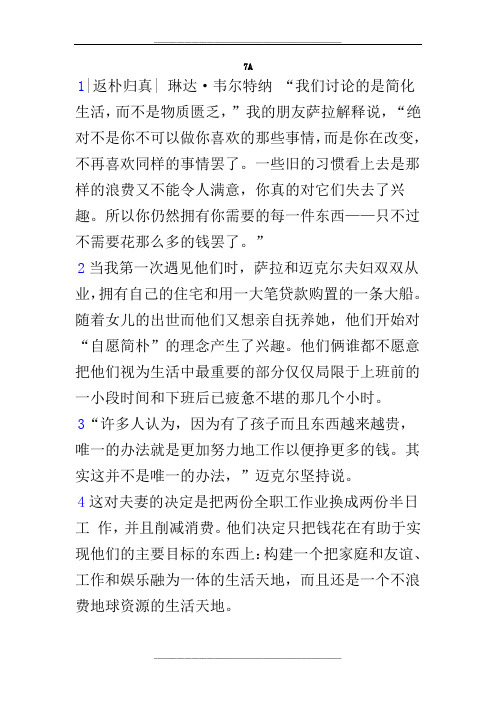
7A1|返朴归真| 琳达·韦尔特纳“我们讨论的是简化生活,而不是物质匮乏,”我的朋友萨拉解释说,“绝对不是你不可以做你喜欢的那些事情,而是你在改变,不再喜欢同样的事情罢了。
一些旧的习惯看上去是那样的浪费又不能令人满意,你真的对它们失去了兴趣。
所以你仍然拥有你需要的每一件东西——只不过不需要花那么多的钱罢了。
”2当我第一次遇见他们时,萨拉和迈克尔夫妇双双从业,拥有自己的住宅和用一大笔贷款购置的一条大船。
随着女儿的出世而他们又想亲自抚养她,他们开始对“自愿简朴”的理念产生了兴趣。
他们俩谁都不愿意把他们视为生活中最重要的部分仅仅局限于上班前的一小段时间和下班后已疲惫不堪的那几个小时。
3“许多人认为,因为有了孩子而且东西越来越贵,唯一的办法就是更加努力地工作以便挣更多的钱。
其实这并不是唯一的办法,”迈克尔坚持说。
4这对夫妻的决定是把两份全职工作业换成两份半日工作,并且削减消费。
他们决定只把钱花在有助于实现他们的主要目标的东西上:构建一个把家庭和友谊、工作和娱乐融为一体的生活天地,而且还是一个不浪费地球资源的生活天地。
5现在他们还在原来的那个近郊社区,住在一幢自己设计的、漂亮而节能的房子里。
按许多标准来看,房子虽然小了点,却容易清扫、布置、维修和供暖。
一层是个大房间,厨房靠墙,摆着一张桦木餐桌和吃饭用的几把椅子;一张舒适的长沙发和一个柴炉就把日常起居的范围圈定了;角落是工作区。
楼上是他们的卧室、一个萨拉和迈克尔共用的办公室和一间浴室。
整幢房子明亮简洁,同周围环境十分和谐。
很快,前门外还要建一个太阳能温室。
6一对只有兼职工作的夫妻怎么会有钱建造自己的房子、拥有一辆汽车并同另一对夫妻共享一艘小船,而且所有这一切都不曾贷款呢?他们如何能够维持足以提供他们想要的“一切”的那样一种高生活水平呢?他们放弃的而且不再怀念是哪些东西呢?7首先,他们放弃了乱七八糟的昂贵东西:(浴室)药柜里满满的从来不用的化妆品和在柜台上随时可以买到的药品;堆放在厨房壁柜里的最终只会丢弃的各种东西。
新世纪大学英语1--Unit 7课文详解

Unit 7 Relationships and Communication
Do you think that interpersonal skills are very important at school and at work? Please share us your opinions.
Kang Min
Unit 7 Relationships and Communication
Parts
Main Ideas
The rise of the issue: people’s complaints about others’ not listening; the possible consequences of the problem. The analysis of the reasons for the failure in communication: misunderstanding resulting from poor listening. How we can be good listeners. Conclusion: restatement of the importance of listening.
Unit 7 Relationships and Communication
We have two ears and one mouth so that we can listen twice as much as we speak.
-------- Epictetus
A Greek Stoic(禁欲主义)philosopher Question for U: Do you agree with Epictetus? State your reasons.
